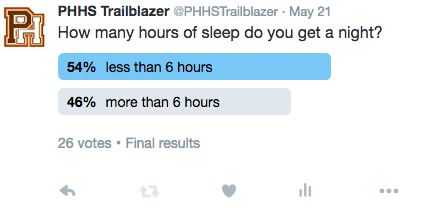
Sleep deprivation among youth has become an epidemic. During sleep, important bodily functions and brain activity occur, such as decrease in blood pressure, increase of blood supply to muscles, growth of tissue, restoration of energy, and the release of hormones.
If you don’t get enough sleep, it can prove to be very harmful, possibly even deadly. Sleep in teenagers is especially important in order to function optimally and get along with family and friends. On top of this, not getting enough sleep can hurt one’s test scores. The brain and body will find a way to sleep if it is craving it.
When asked if junior Sophie Miller thinks she gets enough sleep and whether a lack of sleep impacts her grades, she said, “I definitely don’t get enough sleep and although I’m still getting good grades I think it has impacted my performance in school. I often find myself zoning out, unfocused or half asleep in class which takes away from my education and sometimes results in me having to teach myself the material because I missed it in class due to how tired I was.”
According to an article titled “Sleep and the Teenage Brain” by Maria Popova, “Studies of teenagers around the globe have found that adolescent brains do not start releasing melatonin until around eleven o’clock at night and keep pumping out the hormone well past sunrise… asking a teenager to perform well in a classroom during the early morning is like asking him or her to fly across the country and instantly adjust to the new time zone — and then do the same thing every night, for four years.”
Melatonin is a hormone released around 11 p.m. When students wake up, the melatonin is still pumping through our bodies. Adolescents are always complaining that school starts too soon, and studies show that this may be the case.









































